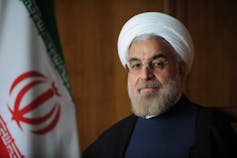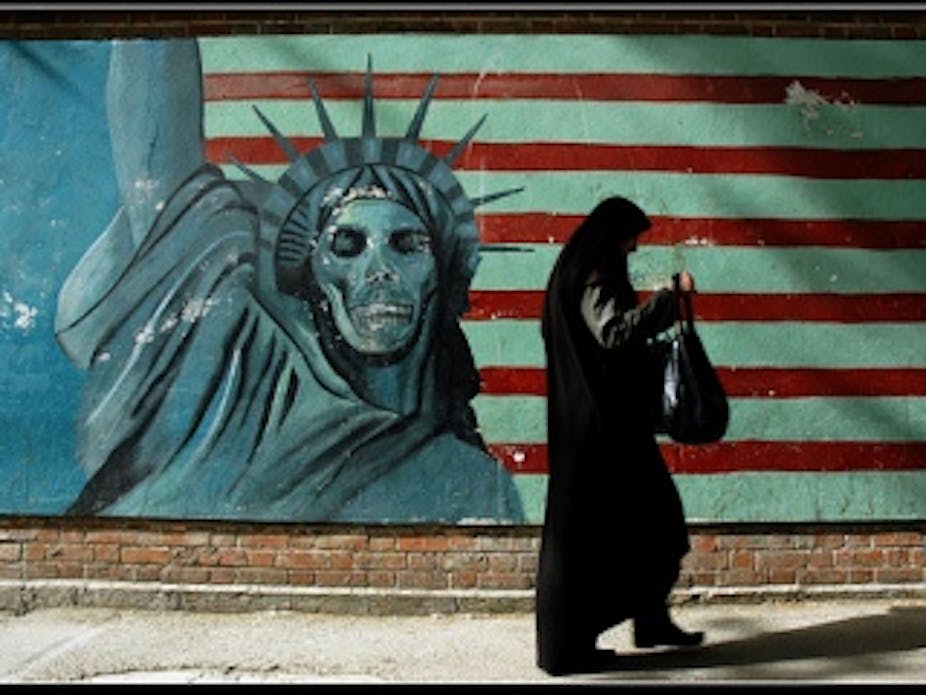After more than three decades of false starts and missed opportunities, something might be finally moving on the diplomatic front between Iran and the United States. The two relatively moderate administrations currently in power in both Tehran and Washington have exchanged letters in the past few weeks and, as The Guardian suggests, they could move over to exchanging handshakes in the coming days.
The White House has denied plans for a face-to-face meeting between Obama and Rowhani, but there has been speculation that with both the leaders at the UN, a “chance meeting in a corridor” might not be entirely out of the picture.
The annual General Assembly at UN headquarters in New York might be shunned by some world leaders, who at times have sent their deputies or foreign ministers to talk to the world at the stone rostrum in the main hall at Turtle Bay, but it is taken seriously by the Islamic Republic’s presidents.
The current supreme leader, Ayatollah Ali Khamenei, made his first and only visit to the West when he visited New York in 1989 as Iranian president. Mohammad Khatami used the opportunity in 1997 to press for his dialogue of civilisations diplomatic gambit and for re-establishing ties with the largely estranged community of Iranian Americans.
Mahmoud Ahmadinejad’s punctual yearly presence in New York became a fixture of American news networks, which gladly conceded him hours of prime airtime, receiving little beyond his buoyant rhetoric in return.
The imminent arrival in New York of Iran’s current president, Hassan Rowhani, might be on an entirely different footing. The early stages of his presidential tenure have been dominated by the need to resolve the endemic nuclear crisis, now in its tenth year and to navigate the worsening situation in Syria, Iran’s only state ally in the Arab world.
Chemical crisis
The sudden precipitation of the Syrian imbroglio, caused by the fallout from the chemical attacks of August 21, have heightened the need for Iranian involvement in the diplomatic flurry that has occurred since. According to an interview by the new dovish foreign minister, Javad Zarif, Iran has been acting in tandem with Russia on a number of fronts.
The quick acceptance of the UN chemical inspectors by the Damascus regime is to be credited, according to Zarif, to joint pressures by Tehran and Moscow. Iran always appears to have had a not insignificant role in the rapid adhesion of the Assad regime to the convention against chemical weapons.

All this has not gone unnoticed in Washington. In an interview with ABC on Sunday, Obama acknowledged that he has been involved in an exchange of letters with Rowhani. For the first time ever, Obama admitted that he had replied to Rowhani, marking a departure from his refusal to engage Ahmadinejad, who had written to him several times, including shortly after his first victory in 2008.
As the optimistic Guardian report suggests, the stage is now set the thawing of a frost which has been in place since soon after New Year’s Eve 1978, when the then shah, Mohammed Reza Pahlavi, entertained Jimmy Carter at his palace in Tehran in the last top-level diplomacy between the two countries.
Several factors warrant caution prior to the start of the UN General Assembly. Rowhani has succeeded in placing Zarif at the foreign ministry and another ally, Admiral Ali Shamkhani, at the helm of the Supreme National Security Council. He will therefore be wary of stoking conservative criticism by engaging immediately at the highest level with the US, certainly prior to receiving informal assurances on the favourable outcomes of such an initiative. The new president has been, however, encouraged by remarks made on Tuesday by Khamenei, who stated that he is not opposed to “flexibility” in Iran’s diplomatic tussle with the West, which he compared to a long-drawn bout of wrestling, Iran’s most popular traditional sport.
Nuclear diplomacy
As Obama told ABC, the Syrian chemical weapons case is a sideshow to the major issue at hand between the two countries, the nuclear one. As part of those negotiations Iran will specifically press for the relaxation of the increasingly suffocating web of sanctions which have been put into place in the last two years. These make repatriation of its oil revenue very difficult as well as trading in gold and foreign currency.
Rowhani is not therefore looking for a photo opportunity, but rather for the chance to take some sting out of his most pressing challenge, that of steering the national economy back to a degree of stability after years of mismanagement and the crippling effects of sanctions. A failure to extract some concessions from the US could put at risk any political capital that Rowhani has managed to extract from hardline conservatives at home.
Whether Obama is willing to entertain such an option depends on the importance the US president assigns to Iran’s role in Syria and, more prominently, the genuineness of the change at the helm of Iran’s nuclear diplomatic decision-making.

The shifting of the nuclear dossier to the foreign ministry means that Zarif is poised to be Tehran’s face to the 5+1 when nuclear talks resume. Zarif is ideally placed for this role, having lived in the US for most of his adult life. He played an instrumental role in securing the deal that paved the way for the formation of a government in post-Taliban Afghanistan in 2001. As Iran’s UN ambassador, Zarif has maintained direct contact with influential senators such as Arlen Specter and Joe Biden.
At the same time, the extensive reshuffling of the nuclear team has not thus far coincided with a change in the Iranian core objective. Rather than bringing about the possibility of a suspension in uranium-related activities, as requested by the UN and the West, Rowhani and his new team have repeatedly talked about “confidence building” on Iran’s existing nuclear activities as the key to the resolution of the contention with the West.
The uncertainty over the Iranian delegation’s contacts with the US team will maintain its intrigue in the days to come, but yet another failure to communicate would be added to a rather thick catalogue of missed opportunities if Rowhani and Zarif’s upcoming visit to New York comes to an end with the two foes continuing to shun each other at the higher state level, as has been the case since Jimmy Carter’s ill-fated New Year greetings three and a half decades ago.

